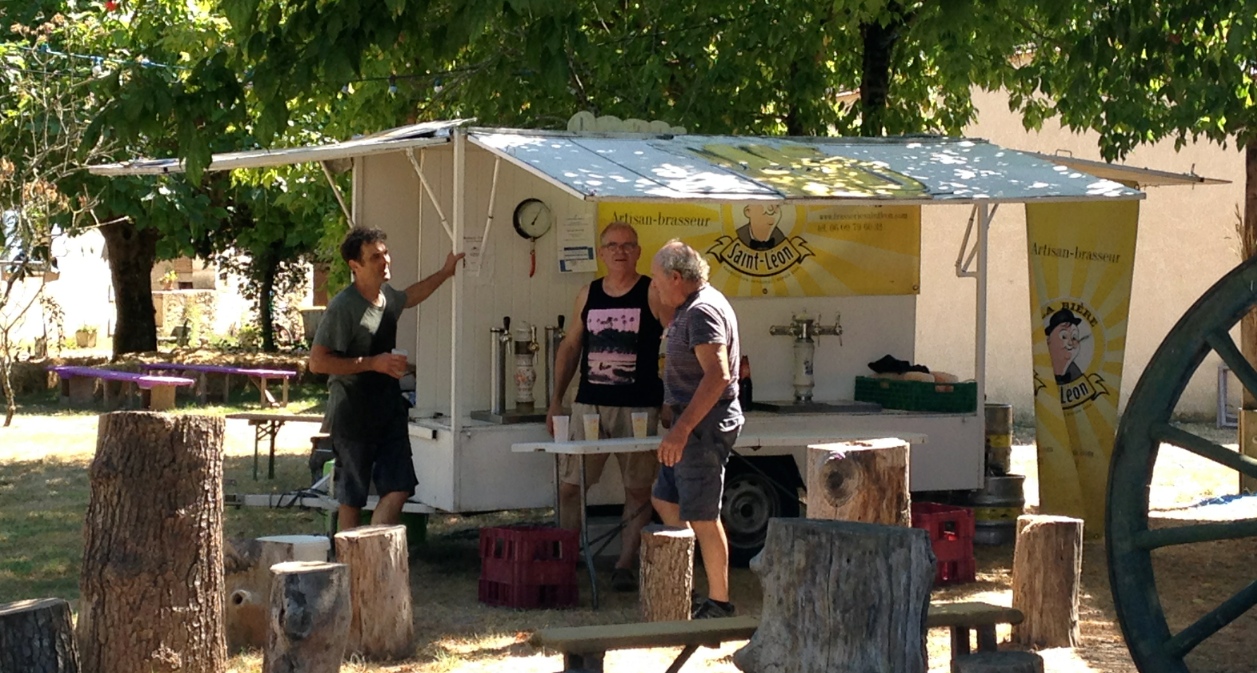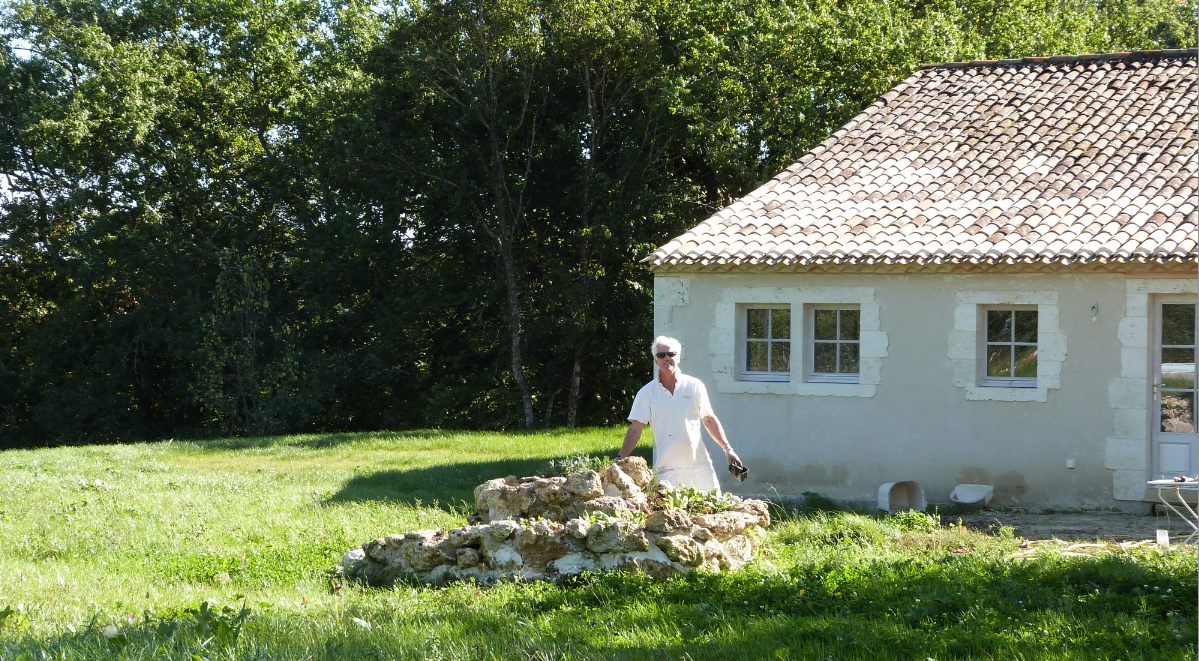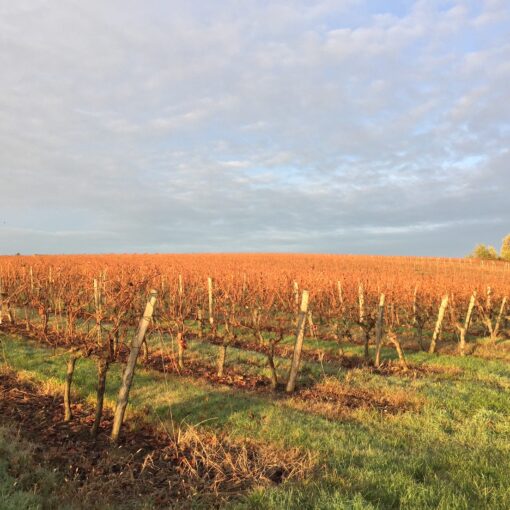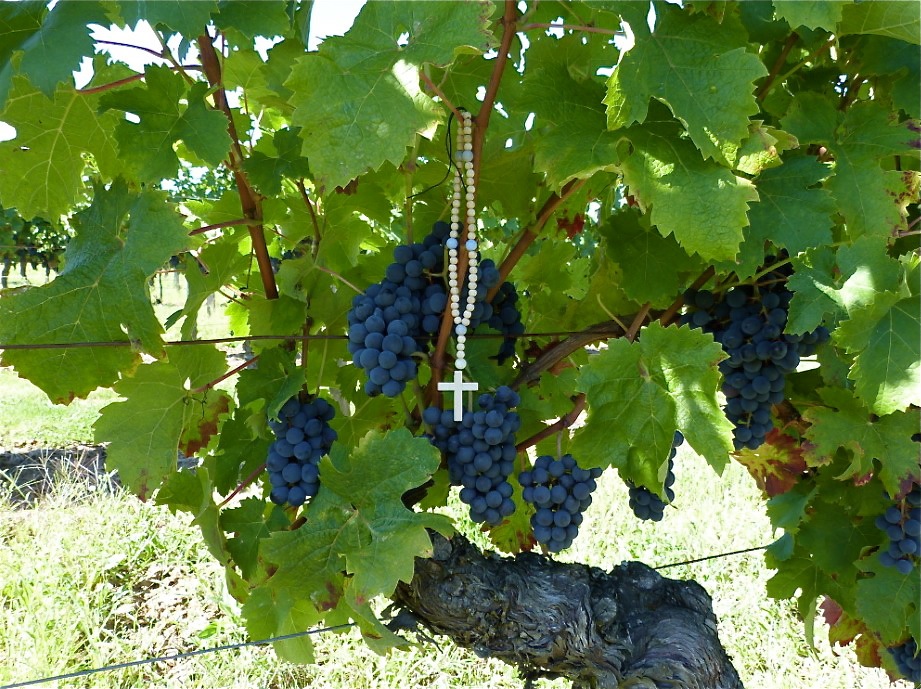Spirit of the Place – Part 2
 The man first came to this place when he was thirteen. The chateau and vineyards had been muddling through a period of benign neglect since the death of his great uncle a decade prior, and now the buildings, lawns, flower beds, gardens, woods, even the river’s cliff – all slept around him like characters under a hundred years’ spell. He planted himself on the terrace over the Dordogne, braced by the allée of centurion linden trees and looked down at the water. The neglect was oddly comforting. Like camouflage. Like a tarnished brooch, content to hide her beauty until an appropriate suitor arrived. It was then that he felt the spirit in this place. It rose up from deep in the earth, from deep inside the subterranean grottoes and rivulets, from deep under the limestone bedrock, from deep under the river herself. He didn’t know then that his life would be cast in a peripatetic vein, counter to the fiber of his earth bound nature. Or maybe he did, for he said to himself that day – there is some spirit in this place; this is where I will set my roots.
The man first came to this place when he was thirteen. The chateau and vineyards had been muddling through a period of benign neglect since the death of his great uncle a decade prior, and now the buildings, lawns, flower beds, gardens, woods, even the river’s cliff – all slept around him like characters under a hundred years’ spell. He planted himself on the terrace over the Dordogne, braced by the allée of centurion linden trees and looked down at the water. The neglect was oddly comforting. Like camouflage. Like a tarnished brooch, content to hide her beauty until an appropriate suitor arrived. It was then that he felt the spirit in this place. It rose up from deep in the earth, from deep inside the subterranean grottoes and rivulets, from deep under the limestone bedrock, from deep under the river herself. He didn’t know then that his life would be cast in a peripatetic vein, counter to the fiber of his earth bound nature. Or maybe he did, for he said to himself that day – there is some spirit in this place; this is where I will set my roots.
And indeed, by the time he was fifteen, his family took up residence. His father was an architect, a Texan in love with the grace of old France and spellbound by his elegant French wife. The energetic couple whizzed around with their five teenagers putting the tattered place in order. The man recalls that when they arrived the grounds had been more or less tended by sheep and the terrace above the river was a slope of clay mud, edging ignobly toward the bank. The house was bare of furniture, paint and wallpaper peeled and the plumbing system cried for merciful death. Mostly he recalls the house had a sense of “other people” living here, that it belonged to other people and had so for a long time. Indeed the youngsters were jarred by the elderly, hunchback gardienne who inhabited the bibliothèque and the cook who slept off his hangovers in an attic bedroom.
But the new family quickly filled up the corners like nest-building swallows, and under Papa’s tasteful eye the feat of restoration began. His guiding principle was respect for the architectural integrity of the 18th century buildings. He understood in his bones that the edifice had been designed by masters to be a noble habitation, but on a human scale. He quoted Protagorus, this was a place where “man was the measure of all things,” where human dimensions dictated proportions, enclosures, apertures. It was a place for living life, not for living in awe. Most significantly, he was not tempted by a certain brand of hubris to stamp his own personality on the original facades or in the perfectly proportioned rooms. Even today, when the mason comes by for repairs he whistles, amazed that the house has not been disfigured or maimed by the whims of successive architectural trends: “les pierres se baignent toujours dans leur jus.”
Within two years, the family enjoyed a fine river terrace, fine rooms, fine appointments and furnishings, a jewel for the many friends and distant relatives who were beneficiaries of another-epoch style hospitality. Afternoon croquet on the manicured north lawn, cocktails at six, formal attire for dinner, clothing freshly laundered, pressed and laid out upon your bed. Of course such style required maid, cook, gardener, gardien… but Maman had been brought up in the best part of Paris 16th and she tossed off the word “domestics” with authority. In her new/old abode she was thoroughly la maitresse de sa maison; always in charge and always correct.
The household flourished. The teenagers wed, bred, returned with babes in arms. It was a glorious time of children laughing and running, of soaring frisbees and soccer tournaments, of rose bushes, window panes and rules broken by the dozen, of silver spoons and marquetterie bent beyond recognition by precious little monsters. Maman loved children above all else, and although they were expected to behave impeccably at table by the age of two or be banished to the “crying room,” beyond table manners, respect for kitchen hours, and no snacking allowed, if you were under eighteen and charming, almost anything went.
Almost. The early years of their reign were also marked by no-children dinners and complex rules of etiquette. I came into the household during this time as a young mother with no prior experience of “the evening separation.” I might have thought it quaint to bid the children goodnight so that we could dine uninterrupted and relish the rare pleasure of finishing a sentence. But when our little ones were summarily sent off to bed in brilliant daylight, they let me know in no uncertain terms I had betrayed them. The eldest even dragged out Stevenson’s poem, “To Bed by Day.” But with absolutely no say in the matter, I perfumed and coiffed myself as I wiped tear-streaked cheeks and read just one more line of “Jemima Puddle Duck,” risking wrath as the dinner bell tolled again, for me.
It was during one of those harried moments, caught between ground floor protocol and nursery floor hysteria that I first heard about the ghosts. Of course it was the children who’d made their acquaintance. Our seven year old wailed that three tiny women paralyzed her by circling in the airs above her pillow. The five year old described the “kiki hibou” (owl) who flew in from the river windows with a fish in his mouth and pinned him to bed with his piercing eyes. Baby soprano added that a naughty boy kept stealing his pretty shoes so he couldn’t come down the stone stairway in his bare feet. I waved them good night with a cheery dismissal of their silly fantasies and then shrunk, crept away, one part relief that the house had organized its own electronic bracelet prisoner system, another part frustration that I had to leave my babes in the hands of their imaginary ghosts for the sake of a dinner bell.
In retrospect, I must say those children were rather disciplined little soldiers. My own encounters with the house ghosts years later were no less startling, and I regret having doubted the innocent. Daughter told me recently that in order to cope she forced herself to “not see them.” But this was a Pyrrhic victory; when she could no longer see the ghosts, there were other things that passed from her vision as well.
* * *
Back in those days, when the children were young and their grandparents were not yet old, the happiest time of all was an ordinary summer evening. At sunset we would gather under the lindens, above the river. I always think of Papa here, absorbing that warm diffused solstice gold, crystal glass of clinking ice and J&B in hand, pensive, observing the last play of colors on his Enlightenment façade.
And then when darkness took over, we played “Deux Cent Un. ” It was a game fit only for twilight hours when bats began to swoop. At the first shriek of the owl, the team showed up, established the course, chose the first spy. The point of the game was to run the entire circle of the east garden by dropping instantly into a hiding place when the spy spun around at intervals to “catch” you with his vision, then to make it back “home” without being seen.
One could not imagine a more ideal spot for such a game. The trees are almost as old as the house. The wide trunked, gnarled lindens, the massive yews, the outsized boxwoods, the intoxicatingly scented magnolias… In twilight the shadows come alive. Oh, the excitement of whispered warnings and strategies, of running in herd with the children around the park when we were nimble enough to sometimes out-race them. Dropping to the ground behind an ancient tree, faces pressed into the earth, breathing hard from exertion, hearts beating in the dark from some unexplainable, primal excitement.
* * *
Many years passed in this way. A few weeks each summer, a place for extended family, for fun and the transmission of culture between grandparents and grandchildren. As time went on, we came more often, we moved a bit closer, we stayed a little longer. We began to take up the yoke of responsibility. Like the proverbial Mrs. Murphy’s Cow, we carried light burdens at first, thinking them quaint and folkloric, adding a few pounds each year. Until, of course, the day we found ourselves with a mountain perched on our shoulders. For a ghost filled, spirit filled place, is a place of curses as well as blessings. Maman once called it an albatross; said it kept such a chain around her ankle she could never take a vacation. Then she would shrug, “mais tant pis, c’est un Paradis.”
 In time, the house became a sort of icon for many of us, an image of something that remains faithful, steadfast, when so much in the world keeps changing beyond recognition. Some people might say that such a perception contains a potentially dangerous kernel: an inability to adapt, an attachment to something frozen, fixed in time, and eventually false. And yet, for our particular little family within a family, often on the move, each child born in a different country, we probably couldn’t prevent ourselves from setting down extra tendrils. With the years, our attachment grew in direct proportion to the heartbreaks of nomadic life; the more often we broke camp, the greater our need for a sense of family stories, culture, legacy. Life seemed to take on a more comforting perspective when you contemplated that these stones have been here for hundreds of years, and when we are dust, they will still stand. Within this thought about mortality, there was the comforting idea that a part of us will live on in these stones, because they are our family stones. We may be nomads, we may be grains of sand in the eye of time, but these buildings will endure, and our passage through them, through our favorite place on this earth, will be etched within the walls of this house.
In time, the house became a sort of icon for many of us, an image of something that remains faithful, steadfast, when so much in the world keeps changing beyond recognition. Some people might say that such a perception contains a potentially dangerous kernel: an inability to adapt, an attachment to something frozen, fixed in time, and eventually false. And yet, for our particular little family within a family, often on the move, each child born in a different country, we probably couldn’t prevent ourselves from setting down extra tendrils. With the years, our attachment grew in direct proportion to the heartbreaks of nomadic life; the more often we broke camp, the greater our need for a sense of family stories, culture, legacy. Life seemed to take on a more comforting perspective when you contemplated that these stones have been here for hundreds of years, and when we are dust, they will still stand. Within this thought about mortality, there was the comforting idea that a part of us will live on in these stones, because they are our family stones. We may be nomads, we may be grains of sand in the eye of time, but these buildings will endure, and our passage through them, through our favorite place on this earth, will be etched within the walls of this house.
During those young years, of course we never consciously thought about any of this. That is a privilege of youth; to race all about, confident and partly unconscious, to allow the weight of history as well as future expectations to seep in and deeply inhabit you, while on the surface you remain insouciant, you are making dandelion rings with the children or making love with your young husband. But in that unconscious manner, which does not after all excuse us, we did cast our lot with House. It was natural. She seemed to embody the Spirit of the Place. And even all those years ago, we sensed that the house ghosts, while terribly interesting, were not the same as this mysterious Spirit. It always seemed to us that she was the source of the energy, not a beneficiary. Something immutable.
In that same spot on the river terrace – under June evening sunlight or in bitter January darkness – if I sit quietly enough, sometimes I can almost see her, like a great white bird, brooding protectively, nourishing this place with her power, nesting over the entire house, wing span expanding wider and wider, up over the plateau, the vineyards, the river, the entire valley.




